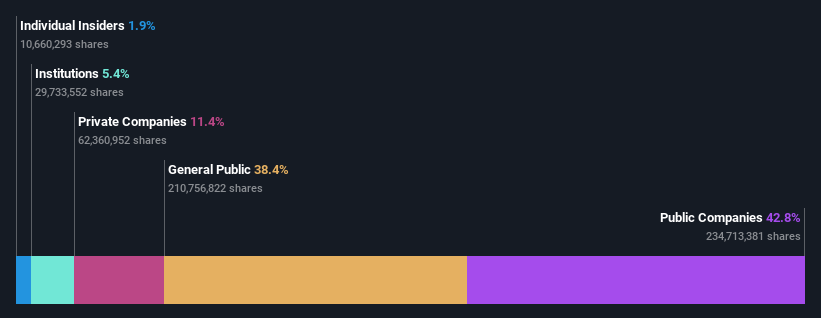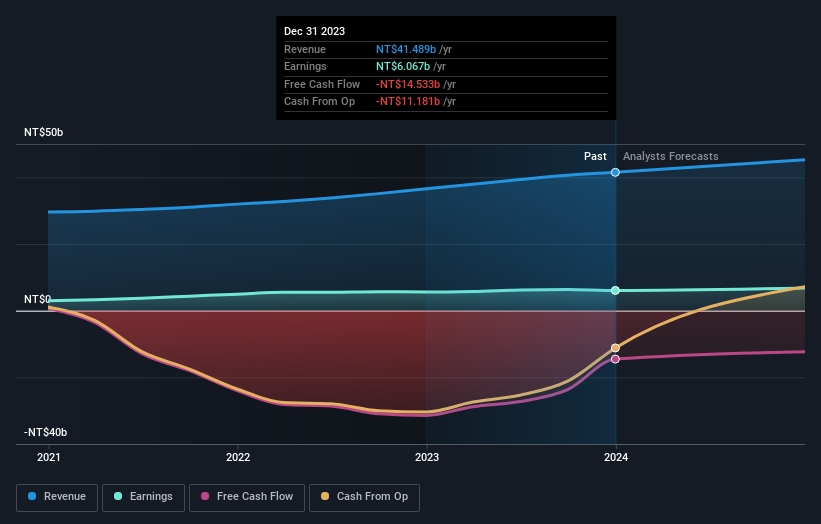Stock Analysis
- Taiwan
- /
- Consumer Finance
- /
- TWSE:9941
Public companies account for 43% of Yulon Finance Corporation's (TWSE:9941) ownership, while individual investors account for 38%

Key Insights
- Significant control over Yulon Finance by public companies implies that the general public has more power to influence management and governance-related decisions
- 50% of the business is held by the top 4 shareholders
- Past performance of a company along with ownership data serve to give a strong idea about prospects for a business
A look at the shareholders of Yulon Finance Corporation (TWSE:9941) can tell us which group is most powerful. And the group that holds the biggest piece of the pie are public companies with 43% ownership. That is, the group stands to benefit the most if the stock rises (or lose the most if there is a downturn).
And individual investors on the other hand have a 38% ownership in the company.
In the chart below, we zoom in on the different ownership groups of Yulon Finance.
Check out our latest analysis for Yulon Finance

What Does The Institutional Ownership Tell Us About Yulon Finance?
Institutions typically measure themselves against a benchmark when reporting to their own investors, so they often become more enthusiastic about a stock once it's included in a major index. We would expect most companies to have some institutions on the register, especially if they are growing.
Yulon Finance already has institutions on the share registry. Indeed, they own a respectable stake in the company. This suggests some credibility amongst professional investors. But we can't rely on that fact alone since institutions make bad investments sometimes, just like everyone does. It is not uncommon to see a big share price drop if two large institutional investors try to sell out of a stock at the same time. So it is worth checking the past earnings trajectory of Yulon Finance, (below). Of course, keep in mind that there are other factors to consider, too.

We note that hedge funds don't have a meaningful investment in Yulon Finance. Yulon Motor Company Ltd. is currently the largest shareholder, with 43% of shares outstanding. In comparison, the second and third largest shareholders hold about 2.8% and 2.7% of the stock.
Our research also brought to light the fact that roughly 50% of the company is controlled by the top 4 shareholders suggesting that these owners wield significant influence on the business.
While it makes sense to study institutional ownership data for a company, it also makes sense to study analyst sentiments to know which way the wind is blowing. While there is some analyst coverage, the company is probably not widely covered. So it could gain more attention, down the track.
Insider Ownership Of Yulon Finance
The definition of an insider can differ slightly between different countries, but members of the board of directors always count. Management ultimately answers to the board. However, it is not uncommon for managers to be executive board members, especially if they are a founder or the CEO.
Insider ownership is positive when it signals leadership are thinking like the true owners of the company. However, high insider ownership can also give immense power to a small group within the company. This can be negative in some circumstances.
Our most recent data indicates that insiders own some shares in Yulon Finance Corporation. It is a pretty big company, so it is generally a positive to see some potentially meaningful alignment. In this case, they own around NT$1.5b worth of shares (at current prices). Most would say this shows alignment of interests between shareholders and the board. Still, it might be worth checking if those insiders have been selling.
General Public Ownership
The general public, who are usually individual investors, hold a 38% stake in Yulon Finance. While this size of ownership may not be enough to sway a policy decision in their favour, they can still make a collective impact on company policies.
Private Company Ownership
We can see that Private Companies own 11%, of the shares on issue. Private companies may be related parties. Sometimes insiders have an interest in a public company through a holding in a private company, rather than in their own capacity as an individual. While it's hard to draw any broad stroke conclusions, it is worth noting as an area for further research.
Public Company Ownership
Public companies currently own 43% of Yulon Finance stock. We can't be certain but it is quite possible this is a strategic stake. The businesses may be similar, or work together.
Next Steps:
I find it very interesting to look at who exactly owns a company. But to truly gain insight, we need to consider other information, too. For example, we've discovered 2 warning signs for Yulon Finance (1 is a bit unpleasant!) that you should be aware of before investing here.
But ultimately it is the future, not the past, that will determine how well the owners of this business will do. Therefore we think it advisable to take a look at this free report showing whether analysts are predicting a brighter future.
NB: Figures in this article are calculated using data from the last twelve months, which refer to the 12-month period ending on the last date of the month the financial statement is dated. This may not be consistent with full year annual report figures.
Valuation is complex, but we're helping make it simple.
Find out whether Yulon Finance is potentially over or undervalued by checking out our comprehensive analysis, which includes fair value estimates, risks and warnings, dividends, insider transactions and financial health.
View the Free AnalysisHave feedback on this article? Concerned about the content? Get in touch with us directly. Alternatively, email editorial-team (at) simplywallst.com.
This article by Simply Wall St is general in nature. We provide commentary based on historical data and analyst forecasts only using an unbiased methodology and our articles are not intended to be financial advice. It does not constitute a recommendation to buy or sell any stock, and does not take account of your objectives, or your financial situation. We aim to bring you long-term focused analysis driven by fundamental data. Note that our analysis may not factor in the latest price-sensitive company announcements or qualitative material. Simply Wall St has no position in any stocks mentioned.

Simply Wall St
About TWSE:9941
Yulon Finance
Yulon Finance Corporation provides various financial services in Taiwan, China, and internationally.
Adequate balance sheet average dividend payer.
